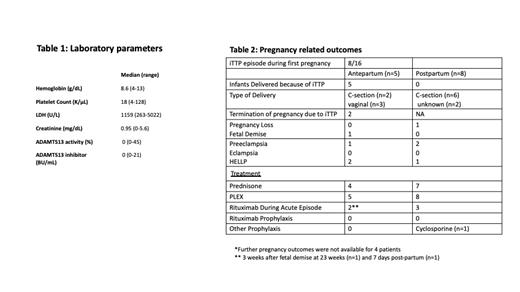Background:
Immune-mediated thrombotic thrombocytopenic purpura (iTTP) is defined by thrombocytopenia and microangiopathic hemolytic anemia without an alternative explanation, confirmed by severely deficient ADAMTS13 (A disintegrin and metalloproteinase with thrombospondin type 1 motifs, member 13) to <10%. It is caused by autoantibodies against the ADAMTS13 protease. Pregnancy can precipitate iTTP, but the diagnosis and treatment are challenging, since it is often difficult to differentiate from other TMAs associated with pregnancy The aim of this study was to describe the clinical presentation, treatment, and outcomes of pregnancy related iTTP.
Methods:
Data was obtained from the USTMA retrospective database, including 15 large USTMA referral centers. Patients were identified based on the diagnosis of iTTP provoked by pregnancy between 9/6/1990 and 6/18/2018. The study cohort included participants with a clinical diagnosis of iTTP, confirmed by ADAMTS13 activity <10% who had a pregnancy or recent delivery within 30 days of presenting with iTTP. For participants diagnosed before the ADAMTS13 assay was developed (2006), the iTTP diagnosis was based on the clinical course and absence of alternative causes. iTTP exacerbation was defined as clinical disease recurrence within 30 days of PLEX (plasma exchange) discontinuation, and clinical relapse was defined as disease recurrence after 30 days of last PLEX. Maternal and fetal outcomes were additionally collected from 7/15 sites.
Results:
42 patients had 55 iTTP episodes provoked by pregnancy. Median age for patients was 29. Sixteen (38.1%) were white, 20 (47.6%) were black. The most common presenting symptoms were headache and fatigue in 11/55 (20%) episodes. Thirty nine (70.9%) episodes had a platelet count <30 x10 9/L, and 46 (83.6%) had laboratory findings concerning for hemolysis as evidenced by elevated lactate dehydrogenase (LDH) and/or schistocytes present on peripheral smear. Only 5 (9%) episodes presented with a creatinine >2 mg/dL. ADAMTS13 activity was documented in 33 (60%) episodes and was <10% in 30 (90.9%) (Table 1).
Treatment with PLEX was described in 30 (54.5%) episodes with a median duration of 6 days (2-26 days). Further immunosuppression included prednisone in 38 (69.1%) episodes and rituximab in 11 (20%), of which 7 (63.6%) had no future exacerbations or relapses during the study period.Seventeen (40.5%) patients had a prior diagnosis of iTTP. There were 10 exacerbations in 8 patients (19%), and 34 relapses in 13 (30%) patients after the 55-pregnancy provoked iTTP episodes. Five of those relapses were triggered again by pregnancy.
Pregnancy related outcomes were obtained in 16 patients. Twenty five percent (4/16) of patients had a prior history of iTTP; median time of last iTTP to current presentation was 34 months (10-108). Of 16 patients, iTTP occurred with first pregnancy in 8 patients. Of the remaining eight patients, iTTP occurred in the eleventh (n=1), ninth (n=1), sixth (n=1), fifth (n=1), fourth (n=2), and unknown (n=2) pregnancy. Only 13 of 16 patients had further pregnancy specific outcomes available (Table 2). Preeclampsia was noted in 3 patients. Seven and 1 patients, presented with iTTP within 30 days postpartum or after miscarriage, respectively. The remaining patients (n=5) developed iTTP during the antepartum period. Of these, 2 pregnancies were terminated due to iTTP (second trimester and third trimester). One of the three remaining pregnancies resulted in fetal demise at 24 weeks. The latter two patients delivered healthy infants. There were no maternal deaths in our cohort.
Conclusions: This is first multicenter descriptive analysis of pregnancy related iTTP from the USTMA registry. The clinical presentation of this cohort is consistent with iTTP triggered by other causes, and the low rate of acute kidney injury is helpful in identifying iTTP from other TMAs in pregnancy. We observed that pregnancy is a risk not only for acute episodes of iTTP in first pregnancy, but also in subsequent pregnancies and in the relapse setting of those with previous diagnosis of iTTP. While there was a 20% and 30% exacerbation and relapse rate respectively, maternal mortality was not observed. Rituximab did not affect maternal mortality. Fetal mortality was affected by iTTP in the antepartum period. These findings will serve as bases of prospective USTMA study for standardize management of this population.
OffLabel Disclosure:
Masias:Argenx: Consultancy; Rigel: Consultancy; Sanofi: Consultancy; Takeda: Consultancy. Sridharan:Sanofi: Consultancy. Burwick:Roche: Consultancy; Astra Zeneca: Consultancy, Speakers Bureau; Alexion: Consultancy, Speakers Bureau; UCB Bioscienses: Consultancy; Comancha: Consultancy. Akwaa:Sobi Pharmaceuticals: Research Funding. Gangaraju:Sanofi Genzyme: Consultancy, Membership on an entity's Board of Directors or advisory committees; Alexion: Consultancy, Membership on an entity's Board of Directors or advisory committees; Takeda: Consultancy. Java:Alexion: Consultancy; AstraZeneca: Consultancy; Novartis: Consultancy; Dianthus Therapeutics: Consultancy; Aurinia Pharmaceuticals: Consultancy; UptoDate: Honoraria. Sukumar:Sanofi Genzyme: Honoraria.
We will discuss the use of Rituximab in pregnancy for immune mediated TTP.


This feature is available to Subscribers Only
Sign In or Create an Account Close Modal